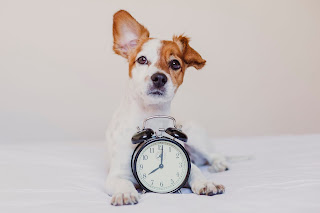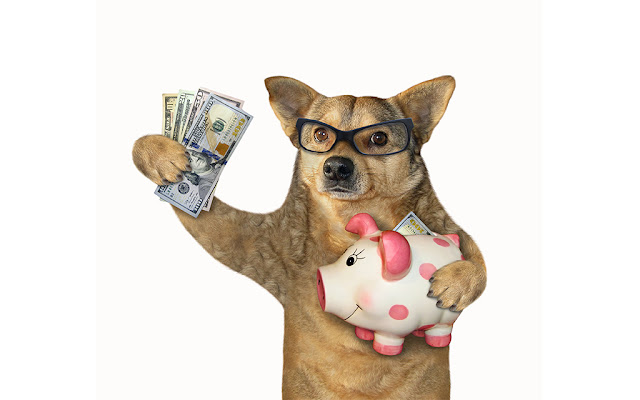Is Having A Dog Worth It ?
It may happen to anybody at any time. You come across a wonderful dog that is searching for a home and gives you that big-eyed look that says, "Pick me." You'll be purchasing dog food and treats at your neighbourhood grocery before you realise it.
It's simple to fall in love with a dog. Sharing your home with a canine companion may be really rewarding. There's no denying that dogs can bring unconditional acceptance and loyalty, as well as constant company and stress relief after a long or stressful day.
Getting a dog, on the other hand, should not be taken lightly. Having a dog requires a significant amount of time, money, and dedication — in many cases, over 15 years. Dog ownership may be tremendously rewarding, but it also comes with a significant amount of responsibility. Here are a few things to think about.
What makes you desire a dog in the first place?
It's a basic question, but one that many people overlook when getting a dog. Getting a dog just because it's "the thing to do" or because your kids have been asking for one might be a huge mistake. Keep in mind that you'll be caring for your new family member for up to 15 years.
Is there enough time for a dog in your life?
Dogs live in packs, and you are now a member of their new pack. They are companion animals that should not be overlooked simply because you are too busy or exhausted to care for them. They demand a lot of attention, including feeding, exercise, and socialisation - dogs require constant contact. Because their owners didn't have the time to train and care for them, many great pets wind up in shelters.
Dogs require a lot of attention, which will detract from your current routine. Many individuals like grooming, walking, and playing with their dog, which is one of the benefits of owning a dog. But it is a regular, ongoing time commitment.
Grooming
This is another aspect where the size, breed, and kind of dog you acquire may have a big impact. A short-haired chihuahua may just need a quick bath in the sink, however a labrador may require more frequent bathing to avoid a smelly coat.
Poodles, Bichon Frises, and Kerry Blue Terriers, for example, don't shed much and require frequent grooming by a skilled dog trimmer. Regular brushing and bathing are required for dogs with long or thick fur.
There are cheaper options (like washing your dog at home or taking him to a DIY dog wash) and more expensive ones (like weekly grooming), but this is absolutely something you should investigate and ask the person you are adopting your dog from.
Dog Training
If you engage a professional dog trainer to deal with your dog, it may be a very costly undertaking. However, doing it yourself as part of a class or group is more successful and enjoyable, and it has the added benefit of letting you and your new dog get to know each other, work toward a common goal, and bond.
If you're on a low budget, you may also take out video courses and books from the library, but you'll need to be extremely adept at establishing and keeping commitments. Dog training is most effective when there is a high level of consistency for the dog.
Walks and Exercise
Even if your dog has a backyard to play in and use the potty, you should schedule an hour of walking time for them each day. It's critical that they get frequent exercise, and depending on the breed, they may require more than an hour of walking every day—or perhaps running or swimming to truly expend their energy. This is particularly crucial for puppies, but older dogs also require frequent exercise.
If you don't have at least that much time to devote to your dog, you should reconsider getting one.
Before you adopt, inquire about the dog's energy level, how much activity it now receives, and how much the adopter believes it will require.
If you know the dog's breed or breeds, you'll be able to estimate how much time you'll need to spend exercising your dog. Huskies, Jack Russell terriers, dalmatians, border collies, and Australian shepherds are all known for their high activity levels. These dogs might become destructive and despondent if they don't receive enough exercise.
Can you afford a dog?
Caring for a dog throughout the course of her life may be costly. Veterinary care, training programmes, grooming, food, toys, treats, boarding, and other costs may quickly mount up.
Food (And Treats)
Of course, dogs need to eat, and treats are a great way to keep your dog motivated while you're training and getting to know him. The amount you spend on this part of dog care varies greatly depending on your dog's size (large dogs eat a lot more than tiny dogs), whether they have any special nutritional needs, and their activity level and age (young, growing dogs need more food than elderly dogs).
You may pick from a wide range of dog meals at various pricing points. Cooking for your dogs (recipes abound online, and it's a simple method to feed your dog high-quality food at a lesser cost) is another option. It might be more expensive if your dog's health concern necessitates a particular food or kind of food, according to the dog rescuer or physician.
Whatever your dog's condition is, plan ahead as much as you can for his size and age— feeding is a recurring expenditure that you should prepare for and shouldn't come as a financial shock.
Veterinary Fees
If you adopt from a reputable organisation, your new dog's health history and records will almost certainly be sent to you. They may or may not have previously spayed or neutered the dog, depending on its age. You may discuss future care with the rescue, and they will have a good understanding of what your pet might require (like additional vaccinations or medications if your pup has an ongoing issue).
Feel free to inquire about pricing; they will most likely be familiar with local prices for what your new puppy need. Veterinary care expenses vary a lot depending on where you live, and an animal rescue group will know what they are in your region and may probably recommend several vets.
If you aren't adopting through a rescue or a group of individuals who foster unwanted pets, make sure to inquire about vet records and anything else that needs to be addressed in terms of your new dog's health. A dog might appear to be in perfect condition yet be hiding health problems ranging from the simple to the complicated, such as worms or ear mites.
You will have to consider an essential and considerable expenditure if the dog is not spayed or neutered. Low-cost spay and neuter programmes are occasionally offered by local veterinarians or animal welfare organisations.
Unless there is a previous record or the person fostering the dog has covered part of these costs, your dog will almost certainly require vaccines. If you're adopting a puppy, you'll have to take it to the doctor for several immunizations and check-ups to ensure it's developing well.
Pets Insurance
Pet insurance helps you to budget for unexpected vet bills resulting from accidents or sickness. Routine care, such as yearly visits, immunizations, and prescriptions, is also covered by certain insurance.
In 2020, 3.45 million dogs were insured, according to the North American Pet Health Insurance Association's annual report. Dog owners in the United States paid an average monthly premium of $18.17 to $49.51 for various levels of coverage.*
Unexpected Expenses
Puppies, in particular, are prone to destroying or breaking furniture, shoes, walls, and clothes. They may become ill or urinate on your prized carpet. Your dog will do something that will cost you money to replace or repair at some time. It will be less distressing if you are prepared for this to happen.
When it comes to continuous medical care once your new dog has settled in, dogs, like people, may have costly mishaps such as ingesting something dangerous to them (see out this list of seemingly innocent items that can make a dog sick) or fracturing a bone. They can also contract infections, develop cancer, or inherit a medical condition such as a weak heart or failing kidneys that requires therapy or medicine. If your dog becomes ill or injured, you should be prepared to make an unexpected trip to the veterinarian.
How much does that cost ?
Consider the financial ramifications of having a dog and whether your budget can withstand the additional expense.
"Owning a dog is a significant responsibility," says Cassie Denger, a Fort Pitt Capital Group client engagement expert. "As a member of your family, their monthly non-discretionary costs will include their daily living expenses."
That means you should budget for puppy care alongside other monthly expenses like food, petrol, and rent. And, while you do so, keep in mind which costs will be one-time and which will be recurrent. "These expenditures may vary depending on the breed and overall health of your new pet," explains Denger.
Dog food would be an ongoing cost. Dog owners are reported to spend $250 to $700 per year on food and treats. It's also typical to employ a dog walker for folks with busy schedules. According to Stregowski, if you hired someone $20 a day to walk your dog every day of the week for a year, you'd spend $5,200 on dog walking alone.
A one-time expenditure may be medication for a short-term illness or supplies like food bowls or dog beds that aren't replaced every few weeks.
According to Stregowski, routine veterinary appointments might cost anywhere from $700 to $2,000 per year for a healthy dog. Additionally, any essential drugs or supplements are projected to cost between $200 and $600 each year.
If you're concerned about medical costs or are drawn to a breed that is more prone to disease, Brandi Hunter, vice president of public relations and communications at the American Kennel Club, recommends acquiring pet insurance.
"Given the expense of pet ownership is unpredictable, it's always preferable to be prepared for the unexpected – especially because every pet will almost certainly have a significant vet bill at some point during its lifespan," Hunter adds.
Buying pet insurance when your dog is young and healthy is often recommended by veterinarians, especially because most plans cover pre-existing diseases.
How can you make having a dog less expensive?
You'll be a less worried pet owner if you save money before bringing your dog home, according to Hunter.
It's also a good idea to set up an emergency fund for your dog, much like it's a good idea for people to have three to six months' worth of living costs set aside in an emergency fund.
Begin by putting aside the money you intend to spend on the dog. This is referred to as "the initial investment" by Hunter. "You may expect to pay $500 to $2000 on a purebred dog if you get it from a breeder," she explains. "Adopting a pet from a shelter or rescue organisation might cost anything from $50 to $200."
Next, consider the other necessities your dog will require, such as food, treats, and frequent grooming visits, and compare pricing. Once you've narrowed down your top choices, add the expenses to your monthly budget to figure out how much you should set aside for an emergency fund.
You should also inquire about the costs of various treatments and procedures at local veterinarian clinics. Inquire about the kind of vet bills that new dog owners are likely to incur. "Think about any monthly preventative maintenance that your dog may require, such as flea and tick or heartworm pills," Denger advises.
Make a note of all the costs you can foresee and add them to your emergency savings account. Prior to adopting or acquiring a dog, try to save enough money to cover at least three months' worth of living expenses for your prospective pet.
You might also consider cost-cutting measures. If you can get away with walking your dog every day instead of employing a dog walker, you'll save a lot of money. You may also ask your veterinarian about dog food products that are both inexpensive and nutritious. Because dog food is clearly a continuous and unavoidable expense, even a little reduction in price per bag can result in significant long-term savings.
"The more you know about the possible costs of keeping a dog, the better off you'll be financially preparing for Fido," says Denger.
Is it a good time to acquire a dog right now?
If you have small children (under the age of six), you should hold off on obtaining a dog for a few years. Dogs may be rather lively, perhaps too much so for many young children; youngsters must also be grown enough to properly care for the dog. If you travel frequently for work, are a student with a rigorous schedule, or are in the military, you should put off getting a dog until you have settled down.
Is it possible for you to have a dog in your home?
Many rentals don't accept dogs or have specific rules on how they should be cared for. Weight or breed restrictions are not commonplace in some locations. Before you bring a dog home to live with you, make sure you read your lease agreement or speak with your housing association.
Will your home environment work for the dog you have in mind?
The size of your dog in relation to the size of your living area isn't the only consideration here. Small dogs, such as terriers, are lively and require a lot of exercise in order to remain calm. Many little dogs will bark at any disturbance, which can be a nuisance for you and your neighbours. On the other hand, some large dogs are quite laid-back and content to lie on the couch all day. Make sure your living arrangement is adequate and that the dog you desire fits into your present lifestyle by doing some study into what various canines require.
When you travel for job or pleasure, do you have someone to care after your dog?
Consider someone you know who owns or loves dogs and would be dependable enough to look after them while you're away. Consider doing some research in your region for excellent boarding facilities or a pet-sitting service.
Will you be a responsible and diligent dog guardian?
If you do not want to breed your dog, spaying or neutering your pet is the appropriate thing to do. Being a good owner includes following licencing and municipal leash requirements, as well as keeping your dog's identification tag up to date. Naturally, your dog will require a lot of love, exercise, company, a good food, and frequent health checkups.
It Isn't Going to Be What You Expected
You won't be able to foresee all of the costs or time you'll spend on your adopted dog, but most people agree that it's well worth it for all of the amazing benefits of having a dog in your life.
You can never know what it will be like, but you can prepare for adoption by being aware of all of these fees so they won't come as a shock—and you can focus on enjoying your new puppy.
Are you prepared to deal with the issues that a dog might bring?
There will always be unanticipated health-related situations, whether you have a puppy or an adult. It's also a good idea to expect some damage around the home and to your personal possessions, especially if you're raising a puppy or a dog that hasn't been housetrained yet.
Some Problem Your face
- Your house will smell like a dog; you won't notice if you live there since your senses will adjust, but trust us when we say that every visitor will smell like a dog. To add to that, here are some of my personal experiences:
- Dogs are expensive, not only to buy but also to care for, including vet fees, possibly surgery, dog food, and grooming.
- You can't go anyplace without thinking about how you're going to take the dogs out. You'll have to walk the dogs and let them use the potty while you're at home. If you need to go out of town, you'll have to rely on family members to dog sit, take the dog with you, or pay for boarding.
- If you're renting, you'll have to look for dog-friendly apartments, which will limit your possibilities. If you do locate a property, there will almost certainly be a monthly cost and a pet deposit.
- If you own a property and want to sell it, some potential buyers will be put off by the fact that the previous owner had dogs, particularly if you have carpet. To get rid of the signs of pet ownership, you'll have to clean twice as hard.
- For the first several months, and maybe for the rest of the dog's life, be prepared to pick up dog faeces and clean pee. Carpet and hardwood flooring may be damaged as a result of this.
- Fleas
- Dogs, like any other pet you bring into your house, can cause allergic reactions in humans. They also intimidate some people, which is helpful if the person in question is a possible burglar, but not so much if the person in question is a friend, relative, or the mailman.
- Dogs enjoy digging, and digging may wreak havoc on your yard or grass. If you take care in your home's well-kept landscape, you may be annoyed by your dog's damaging outdoor behaviour.
- Some dogs bark more than others, but almost all dogs do it. This can irritate a lot of people. It might be as simple as someone passing by on a bicycle, or it can be a noise they aren't used to. They just want to be noticed at times. Barking is inconvenient for whatever reason. Many dogs bark while left at home or in the car, and while you won't hear them because you'll be gone, your neighbours may have something to say about it.
- Dogs do not live for very long. Over the years, you have an extraordinarily tight bond with them, and then one day they die. For youngsters, this may be very upsetting. A dog's lifetime typically ranges from 7 to 12 years, depending on the breed.
- Dogs should have a fenced yard. Even for toilet breaks, you'd have to take your dog outside on a leash if you didn't have a fenced yard. That isn't fair to any dog that isn't a Chihuahua.
Some benefits of having a dog
1.We feel less alone when we have a dog.
Even when people are unavailable, dogs may be there for you. They provide unconditional affection, emotional support, and frequent cuddling, all of which assist to alleviate social isolation. A modest Australian research revealed that having a dog helps people feel less lonely.
The Human Animal Bond Research Institute conducted a countrywide poll of pet owners and non-pet owners, and found that 85 percent of respondents feel that interacting with pets lowers loneliness. The majority of people believe that human-pet interactions can assist with social isolation.
2.Dogs are beneficial to your cardiovascular system. ( your heart )
Having a dog in your life can help you live longer. Dog owners have a decreased risk of mortality, according to a study of research published between 1950 and 2019. According to studies, dog owners had lower blood pressure and better stress reactions.
People who had previously suffered coronary episodes had a much greater degree of risk reduction for mortality when they lived with a dog. The link between people and dogs, according to research, decreases stress, which is a key cause of cardiovascular diseases.
3.Dogs help you stop stressing out.
Your canine buddy may provide you with comfort and help you relax. Dogs and therapy dogs have been shown in several studies to assist people cope with stress and anxiety.
Even touching a familiar dog reduces blood pressure, pulse rate, breathing rate, and muscular tension. Scientists at Washington State University revealed that touching a dog for only 10 minutes can have a big influence. Cortisol, a main stress hormone, was found to be significantly lower among study participants.
4.Dogs assist us in coping with problems.
Dogs aid in our psychological recovery after a crisis. Military veterans with PTSD who have a service dog perform better medically and mentally, according to Purdue University's College of Veterinary Medicine. Veterans who had a service dog had much less PTSD symptoms and better coping abilities.
5.Dogs inspire you to get up and move .
Long walks on sidewalks, trails, and routes accumulate. Dog owners are nearly four times more likely than non-dog owners to achieve daily physical activity recommendations, according to a British research published in 2019. Every week, dog owners walk their pets for roughly 300 minutes. That's 200 minutes more walking than folks who don't have their own dog.
6.Even virtually, dogs make you more beautiful.
It might be time to buy a dog if you're searching for a date. People may look more liked and appealing when they are accompanied by a dog.
When males brought a dog with them, they were more likely to gain a woman's phone number, according to a series of research. Researchers in another study asked participants to judge people in images and discovered that persons who appeared with a dog appeared happier and more relaxed.
According to Pet Wingman, when a profile photo of their dog is included, men and women swipe right more. With dogs on their profiles, women profited more than men. (Finding images of Fido on your camera roll shouldn't be a problem; according to a research, 65 percent of dog owners admit to snapping more photos of their dog than their significant other.)
7.We become more sociable as a result of our interactions with dogs.
Walking with a canine buddy can help us become more accessible and provide a topic of discussion. Consider how many times you've spoken with strangers, whether they're your neighbours or new dog park pals.
According to studies, roughly 40% of dog owners had an easier time establishing friends. Dogs are a fantastic way to meet new people and create new connections.
People who have a deep bond to a pet feel more connected in their human relationships and communities, according to a research conducted at Tufts University's Cummings School of Veterinary Medicine.
8.Dogs are so lovely that they make us fall in love with them.
There's a reason pups are so appealing: they have a "infant schema" in their facial characteristics. Humans' intrinsic caretaker response is triggered by these "social releasers." So, the next time you can't get enough of a dog video, remember that those huge eyes and floppy ears are scientifically enticing.
9.Dogs help us feel better and happier
Simply looking at a dog can make you feel better: a 2009 Japanese study discovered that starring into your dog's eyes increases your level of oxytocin, popularly known as the "love hormone." They are natural mood enhancers, in addition to the normal health advantages of owning a dog. According to a 2017 study, people with AIDS who own a pet are less likely to be depressed.
10.Seniors benefit from dogs in terms of cognitive function and social connection.
The impact of dogs on older citizens have been proven to be good in studies. According to one research, pet therapy enhances the cognitive performance of long-term care individuals with mental illnesses. Another study found that seniors with dementia had fewer agitated behaviours and had better social relations.
Unconditional love and support are provided by a four-legged best friend, which is especially vital during difficult times. Though some may believe we look after our canine partners, the relationship is reciprocal: dogs look after humans, and science backs this up.
11.Dogs make wonderful companions
Watching the BBQ of the owner's puppy
One of the most obvious advantages of having a dog is that it is nearly impossible to feel lonely while your dog is at your side, and with good cause. Most dogs, whether canine or human, are quite gregarious and enjoy company.
You know you always have a companion by your side when your puppy eagerly meets you after a long day at work or looks forward to being taken on their favourite stroll.
12.Dogs offer us important lessons and teach us valuable skills
Dog owners are well aware that training takes time, effort, and patience, all of which are attributes that may be applied to other parts of our life. However, owning a dog teaches us more than that. Our dogs truly know how to lead by example when it comes to pleasure, from enjoying the great outdoors to appreciating the tiny things in life. Dogs and kids are a great pair because they can teach them a lot about responsibility. Make your child accountable for one area of your dog's day, such as feeding them in the evening or combing them at night (but supervise everything!) and you'll be teaching them essential life skills that they won't get anyplace else.
Other advantages of owning a dog
- Dog owners have a better immune system, which helps them stay well and spend less time recovering from illnesses and pests. In fact, dog owners see the doctor less frequently and are less likely to be on medicine than non-dog owners.
- When people have a dog, they recover quicker from diseases and even have a better chance of surviving a heart attack.
- Children with a furry buddy miss fewer school days owing to illness.
- When children with chronic diseases have a canine friend, they frequently deal better with therapy.
- Dogs offer us a sense of emotional well-being because of their unconditional affection, which is why they're also terrific companionship and comfort for lonely individuals.
- Owning a dog can aid in the recovery of persons who have experienced personal pain, such as loss.
- Dog ownership can aid in the recovery and well-being of persons suffering from mental illnesses.
Your dog is yours for the rest of your life.
It's a big list of questions, but it's critical that you consider all of the obligations that come with owning a dog. Too many pets end up in shelters as a result of individuals not asking themselves these questions. Please try not to make this typical blunder again. Consider how your life will alter after you get a dog. Having a dog may be quite rewarding if you're prepared to take on the responsibilities.











